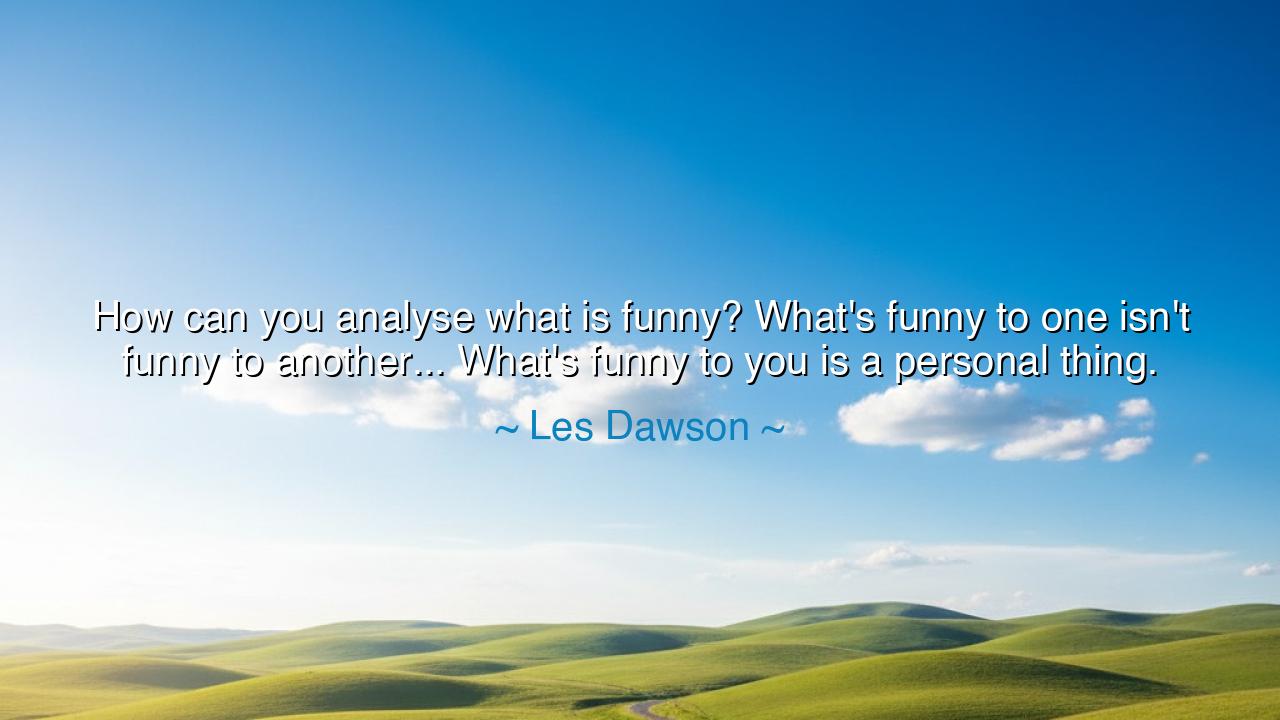
How can you analyse what is funny? What's funny to one isn't
How can you analyse what is funny? What's funny to one isn't funny to another... What's funny to you is a personal thing.






“How can you analyse what is funny? What’s funny to one isn’t funny to another... What’s funny to you is a personal thing.” Thus spoke Les Dawson, the philosopher of laughter cloaked in the robes of a comedian. His words, though simple, strike at the very mystery of the human spirit—the enigma of humor, that strange force that unites and divides us, that brings tears of joy or silence of confusion, that exposes truth in disguise. In his reflection lies an ancient truth: that laughter, like love, cannot be fully explained, only experienced.
When Dawson asks, “How can you analyse what is funny?”, he challenges the mind’s arrogance. The funny, like music or art, resists dissection. It dies when placed upon the table of analysis, for laughter is born not of reason but of revelation. The philosopher may measure logic, and the scientist may chart emotion, but neither can pin down the spark that turns surprise into joy. Humor is a flame that lives in the heart’s timing—a harmony of word, tone, and soul. To laugh is to recognize the absurdity of existence and embrace it without shame.
The ancients knew this well. Aristotle once said that man is the only creature who laughs, for laughter springs from consciousness itself—the awareness of contradiction, of imperfection, of the divine dance between tragedy and comedy. To some, the misstep of a fool brings laughter; to others, it brings sorrow. The same moment that makes one man roar with delight may make another wince. This is the essence of Dawson’s wisdom: humor is subjective, not universal. It flows from the hidden chambers of each person’s life—their memories, struggles, and longings.
In the marketplaces of Athens and the theatres of Rome, comedians rose and fell upon this truth. The great Plautus, whose plays delighted the Romans, once lamented that a joke that stirred applause in one crowd could fall dead before another. It was never the words themselves that mattered—it was the connection between souls, the invisible bridge of shared experience. So it is today. The same jest that makes a child giggle may leave an old philosopher unmoved. Humor is not a formula, but a meeting of hearts in the same moment of recognition.
Les Dawson himself embodied this understanding. Known for his sharp wit and his deliberate playing of the piano off-key, he turned imperfection into comedy. His humor was not cruel but human—born of the awkwardness, the failures, the quiet dignity of ordinary people. He made the world laugh because he did not strive to please everyone; he laughed first at himself. In this way, his art was not about analysis, but about authenticity. He trusted the instinct of laughter—the spontaneous truth that bursts forth before thought can intervene.
The personal nature of humor reminds us that to truly connect with others, we must listen deeply to their hearts. To laugh together is to share understanding without words. In a divided world, laughter becomes a form of unity, a sacred recognition that beneath our differences, we all stumble through the same human comedy. And yet, Dawson’s warning also stands: not all will find the same things funny, and that is no cause for anger or scorn. To accept another’s silence in the face of our laughter is also a form of wisdom.
So, dear listener, take this teaching to heart: do not seek to analyse humor, but to feel it. Let laughter arise naturally, like sunlight breaking through cloud. When you find something funny, cherish that spark—it is the soul reminding you that life, even in its sorrow, can still surprise and delight. And when another does not share your laughter, do not withdraw, for their path of joy may differ from yours.
For in the end, as Les Dawson teaches, humor is not a science but a communion. It is the echo of the divine joke that life itself plays upon us all: that we take ourselves too seriously, when all along, the universe is smiling. Therefore, laugh when you can, forgive when you cannot, and remember that what is funny to you is your own secret truth—a melody that belongs to your spirit alone.






AAdministratorAdministrator
Welcome, honored guests. Please leave a comment, we will respond soon